Equity Bank Bundle
Who Really Owns Equity Bank?
Unraveling the Equity Bank SWOT Analysis is just the beginning; understanding its ownership structure is key to informed investment decisions. From its humble beginnings in Kansas to its current status on the NYSE, Equity Bank's journey is a testament to strategic growth and evolving investor interests. Knowing who controls Equity Group Holdings and the Equity Bank parent company is vital for anyone looking to understand this financial institution's future.
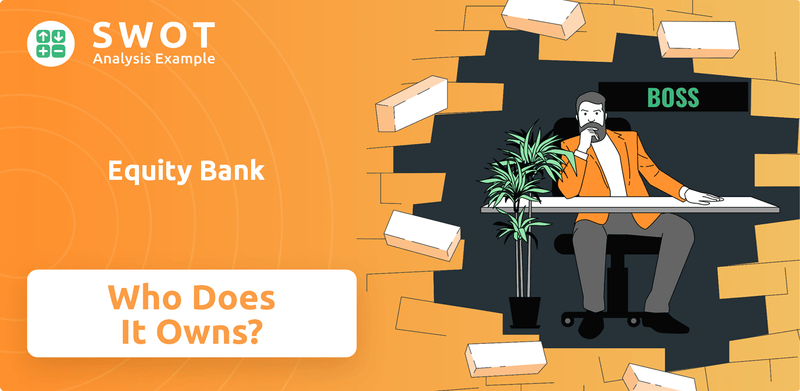
This comprehensive analysis explores the Equity Bank ownership landscape, from the initial vision of founder Brad Elliott to the current roster of Equity Bank shareholders. We'll examine the Equity Bank ownership structure, including major shareholders and the influence of institutional investors, to give you a complete view. Whether you're curious about Equity Bank Kenya ownership details or simply want to know who is the CEO of Equity Bank, this piece provides the insights you need.
Who Founded Equity Bank?
The story of Equity Bancshares, Inc. began in November 2002, with Brad S. Elliott at the helm as founder. Elliott, drawing on over two decades of experience in commercial banking, including a role as Regional President for a Kansas bank with over $1.0 billion in assets, set the stage for the company's formation. His vision was to build a bank with a strong presence in the communities it served.
The initial operations commenced in 2003 with the acquisition of the National Bank of Andover. This strategic move marked the beginning of Elliott's expansion strategy. While specific details about the initial equity split among founders or early investors are not readily available, the focus was clearly on growth and establishing a firm foundation.
Early expansion efforts included acquiring two locations from Hillcrest Bank in Wichita, Kansas, in 2005. The early ownership structure likely consisted of the founders and a limited number of private investors, typical for a privately held company in its early stages. The primary goal was to expand the bank's footprint within the target communities.
Brad S. Elliott founded the company in November 2002. He brought extensive commercial banking experience to the table.
The company started operations in 2003 with the acquisition of the National Bank of Andover.
Expansion included acquiring locations from Hillcrest Bank in Wichita, Kansas, in 2005.
Early ownership was primarily concentrated among the founders and a limited number of private investors.
The founding vision, as articulated by Elliott, centered on expanding the bank's footprint across target communities.
The company was privately held during its nascent stages, with ownership concentrated among founders and a small group of investors.
Understanding the initial ownership of Equity Bank is crucial to understanding its trajectory. While the exact details of the early equity distribution are not publicly available, the company's growth strategy, led by Brad S. Elliott, focused on strategic acquisitions and expansion. For more insights into the business model and revenue streams, you can read about the Revenue Streams & Business Model of Equity Bank. The early focus was on establishing a strong presence in target communities, setting the stage for the bank's future development and the eventual evolution of its shareholder base. Information about the current Equity Bank ownership structure can be found in the company's investor relations materials.
The founder, Brad S. Elliott, played a pivotal role in the company's early development.
- The initial ownership structure was primarily among founders and early investors.
- Early expansion focused on strategic acquisitions within target communities.
- The company's growth strategy focused on expansion and establishing a strong presence.
- The early vision was centered on expanding the bank's footprint across target communities.
Equity Bank SWOT Analysis
- Complete SWOT Breakdown
- Fully Customizable
- Editable in Excel & Word
- Professional Formatting
- Investor-Ready Format
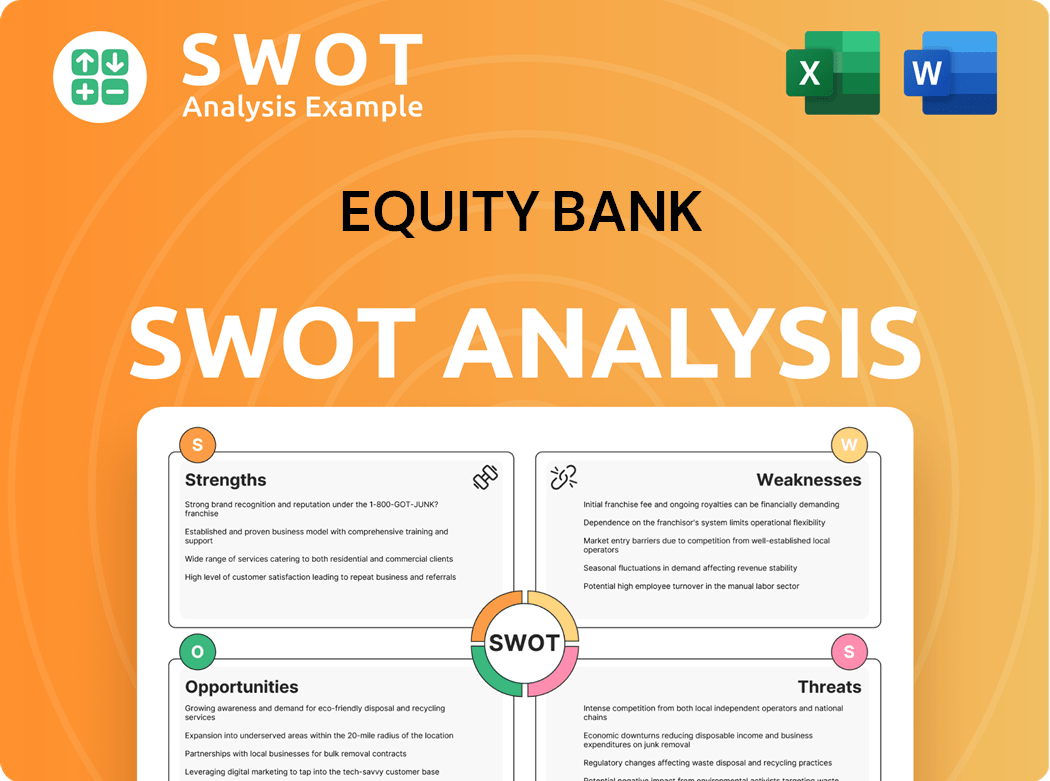
How Has Equity Bank’s Ownership Changed Over Time?
The ownership structure of Equity Bancshares, Inc. has evolved since its Initial Public Offering (IPO) in November 2015. The company expanded through strategic acquisitions, including the acquisition of Community First Bancshares of Harrison, Arkansas, which occurred in the year following its IPO. This growth trajectory has shaped the current shareholder landscape.
As of March 31, 2025, and remaining unchanged in April 2025, institutional investors held a significant portion, approximately 73.75%, of Equity Bancshares' Class A Common Stock. This indicates a strong presence of institutional influence within the company's ownership. Insiders held 3.84% of the shares in April 2025, a slight decrease from 3.87% in March 2025. Mutual funds increased their holdings from 48.46% to 49.04% in April 2025.
| Shareholder Type | March 31, 2025 | April 2025 |
|---|---|---|
| Institutional Investors | 73.75% | 73.75% |
| Insiders | 3.87% | 3.84% |
| Mutual Funds | 48.46% | 49.04% |
Key institutional shareholders as of March 31, 2025, included T. Rowe Price Investment Management, Inc. with 1,547,284 shares, Blackrock, Inc. with 1,358,068 shares, Patriot Financial Partners Gp, Lp. with 1,217,214 shares, FJ Capital Management Llc. with 1,206,571 shares, and Vanguard Group Inc. with 888,650 shares. The concentration of ownership among these major holders suggests their decisions can significantly impact the stock price. For more information on Equity Bank's financial performance, you can refer to this detailed analysis of Equity Bank's financial health.
Understanding the ownership structure of Equity Bank is crucial for investors and stakeholders. Institutional investors hold a significant portion of the company's stock, influencing market dynamics.
- Institutional investors held 73.75% of the shares as of April 2025.
- Insiders held 3.84% of the shares in April 2025.
- Mutual funds increased their holdings to 49.04% in April 2025.
Equity Bank PESTLE Analysis
- Covers All 6 PESTLE Categories
- No Research Needed – Save Hours of Work
- Built by Experts, Trusted by Consultants
- Instant Download, Ready to Use
- 100% Editable, Fully Customizable
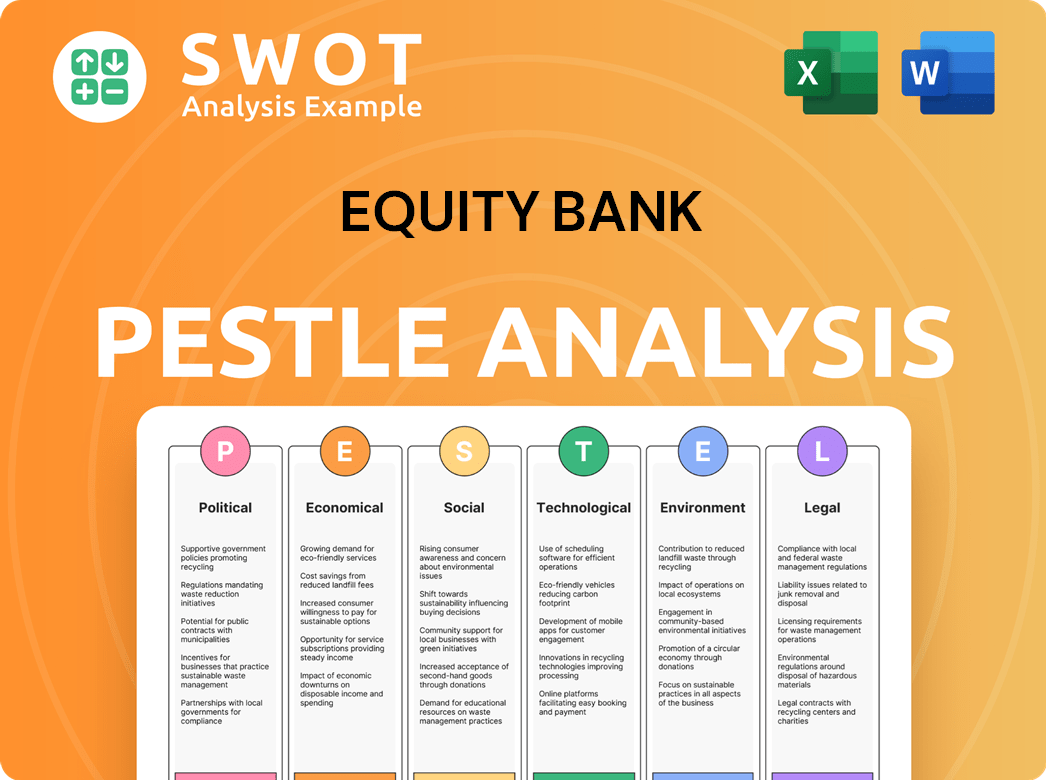
Who Sits on Equity Bank’s Board?
The Board of Directors of Equity Bancshares, Inc. oversees the company's strategic direction. Brad S. Elliott, the founder, holds the positions of Chairman and Chief Executive Officer. Shawn D. Penner has been a board member since 2003. Other directors include Kevin E. Cook, Junetta M. Everett, and Gregory H. Kossover. These individuals were nominated to serve as Class II directors until the 2027 Annual Meeting of Stockholders.
The composition of the board ensures diverse perspectives and experience in guiding the company's operations. The board's role is critical in maintaining corporate governance and making key decisions that affect the bank's performance and future. Understanding the board's structure is essential for anyone interested in the bank's ownership and management.
| Director | Title | Since |
|---|---|---|
| Brad S. Elliott | Chairman and Chief Executive Officer | N/A |
| Shawn D. Penner | Director | 2003 |
| Kevin E. Cook | Director | N/A |
| Junetta M. Everett | Director | N/A |
| Gregory H. Kossover | Director | N/A |
Regarding voting, each holder of Class A Common Stock is entitled to one vote per share on all matters at the Annual Meeting. The company's Articles of Incorporation prevent cumulative voting in director elections. A quorum requires at least one-half of the outstanding Class A Common Stock shares, represented in person or by proxy. The election of directors needs a majority vote of the Class A Common Stock present. Certain actions, such as removing directors without cause or amending specific articles, demand a supermajority affirmative vote of at least 66 2/3% of the voting power of all outstanding voting stock. This structure ensures significant decisions require broad shareholder support.
The ownership structure of Equity Bank is crucial for understanding its governance and control. Knowing who owns Equity Bank helps in evaluating the company's strategic direction and financial performance. For more insights, you can read a Brief History of Equity Bank.
- The Board of Directors oversees the company's strategic direction.
- Each holder of Class A Common Stock has one vote per share.
- Certain actions require a supermajority vote of 66 2/3%.
- Understanding the ownership structure is key to assessing the bank's governance.
Equity Bank Business Model Canvas
- Complete 9-Block Business Model Canvas
- Effortlessly Communicate Your Business Strategy
- Investor-Ready BMC Format
- 100% Editable and Customizable
- Clear and Structured Layout
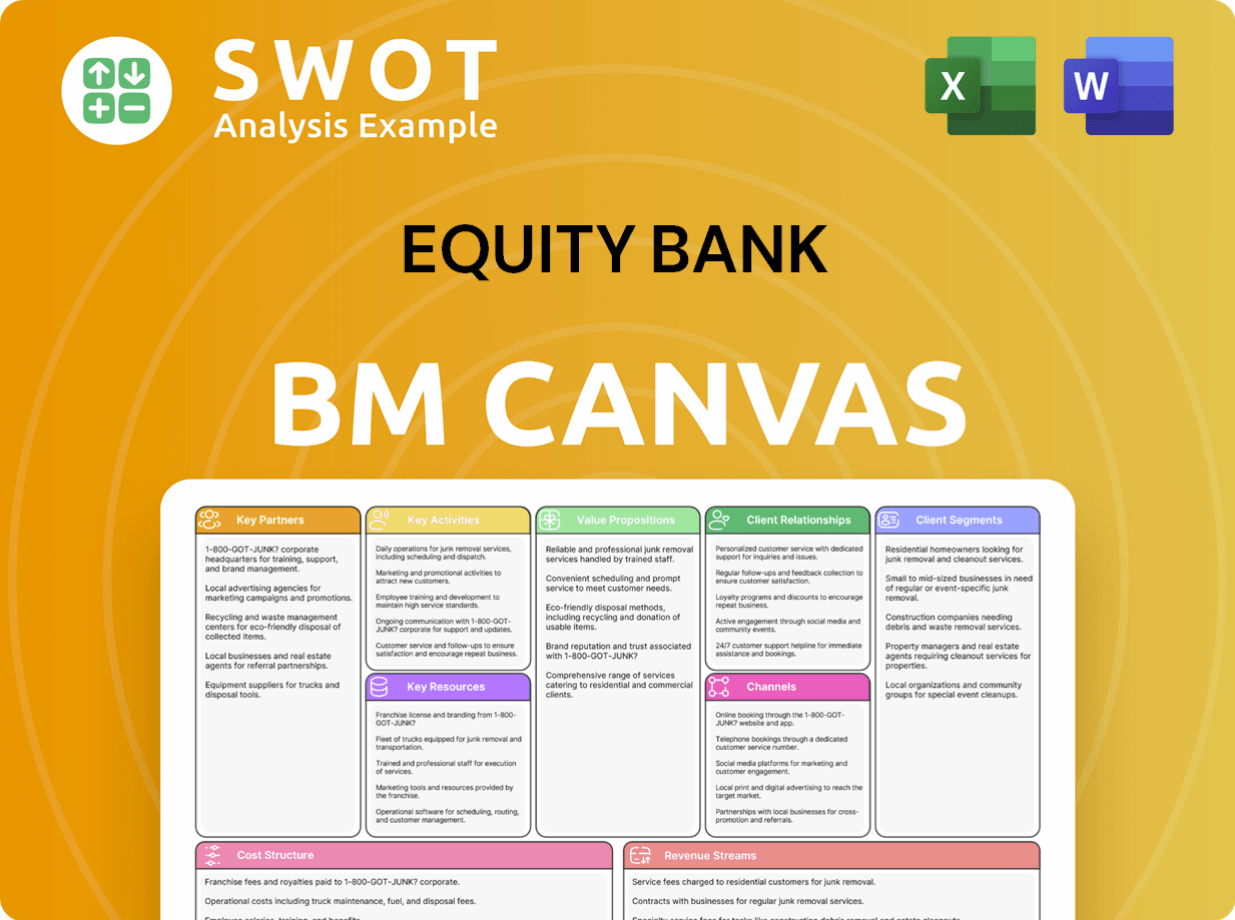
What Recent Changes Have Shaped Equity Bank’s Ownership Landscape?
In the last few years, Equity Bancshares, Inc. has been actively expanding through mergers and acquisitions. In April 2025, a merger agreement with NBC Corp. of Oklahoma, the parent company of NBC Bank, was announced, with the deal expected to close in the third quarter of 2025. This strategic move will add seven locations to Equity Bank's network, resulting in a total of 82 bank locations and increasing total assets to $6.4 billion from $5.3 billion as of December 31, 2024. NBC Corp. will receive approximately 80% of its consideration in EQBK stock. This transaction marks Equity's 25th strategic transaction since its founding in 2002, and the 13th whole-bank acquisition since its IPO in 2015.
The company has also demonstrated its commitment to capital management through dividends. A $0.15 dividend on outstanding common shares was announced as of March 31, 2025, and again as of December 31, 2024. While the share repurchase program remains active, no shares were purchased during the first quarter of 2025.
| Metric | April 2025 | December 31, 2024 |
|---|---|---|
| Institutional Ownership | 73.75% | Not Available |
| Mutual Funds Ownership | 49.04% | Not Available |
| Insiders Ownership | 3.84% | Not Available |
Overall ownership trends show a continued strong institutional presence. As of April 2025, institutional investors held a significant 73.75%, while mutual funds increased their holdings to 49.04%. Insiders, however, slightly decreased their holdings to 3.84% in April 2025. These trends reflect a continued confidence from institutional investors in Equity Bancshares' growth strategy, particularly its inorganic expansion through acquisitions. If you're interested in learning more about Equity Bank's target market, you can read about it in this article: Target Market of Equity Bank.
Equity Bank's ownership is primarily held by institutional investors and mutual funds, with a smaller percentage owned by insiders. The company's ownership structure reflects a mix of public and private investors.
Major shareholders include institutional investors and mutual funds, who collectively hold a significant portion of the company's stock. These shareholders play a crucial role in the bank's strategic direction.
Equity Bank is primarily owned by institutional investors and mutual funds, indicating strong confidence in its growth strategy. Insiders also hold a portion of the shares.
Equity Bancshares, Inc. is the parent company of Equity Bank. The company has been actively expanding through mergers and acquisitions to grow its market presence.
Equity Bank Porter's Five Forces Analysis
- Covers All 5 Competitive Forces in Detail
- Structured for Consultants, Students, and Founders
- 100% Editable in Microsoft Word & Excel
- Instant Digital Download – Use Immediately
- Compatible with Mac & PC – Fully Unlocked
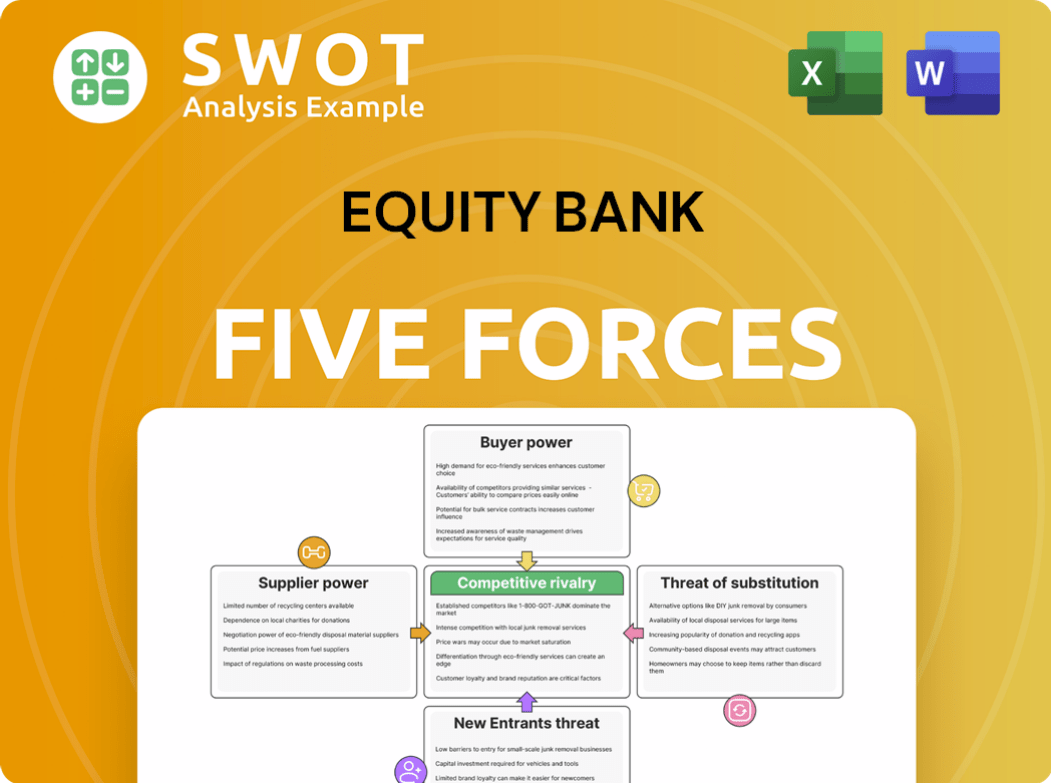
Related Blogs
- What are Mission Vision & Core Values of Equity Bank Company?
- What is Competitive Landscape of Equity Bank Company?
- What is Growth Strategy and Future Prospects of Equity Bank Company?
- How Does Equity Bank Company Work?
- What is Sales and Marketing Strategy of Equity Bank Company?
- What is Brief History of Equity Bank Company?
- What is Customer Demographics and Target Market of Equity Bank Company?
Disclaimer
All information, articles, and product details provided on this website are for general informational and educational purposes only. We do not claim any ownership over, nor do we intend to infringe upon, any trademarks, copyrights, logos, brand names, or other intellectual property mentioned or depicted on this site. Such intellectual property remains the property of its respective owners, and any references here are made solely for identification or informational purposes, without implying any affiliation, endorsement, or partnership.
We make no representations or warranties, express or implied, regarding the accuracy, completeness, or suitability of any content or products presented. Nothing on this website should be construed as legal, tax, investment, financial, medical, or other professional advice. In addition, no part of this site—including articles or product references—constitutes a solicitation, recommendation, endorsement, advertisement, or offer to buy or sell any securities, franchises, or other financial instruments, particularly in jurisdictions where such activity would be unlawful.
All content is of a general nature and may not address the specific circumstances of any individual or entity. It is not a substitute for professional advice or services. Any actions you take based on the information provided here are strictly at your own risk. You accept full responsibility for any decisions or outcomes arising from your use of this website and agree to release us from any liability in connection with your use of, or reliance upon, the content or products found herein.